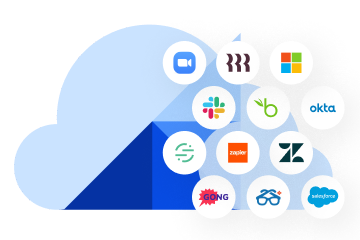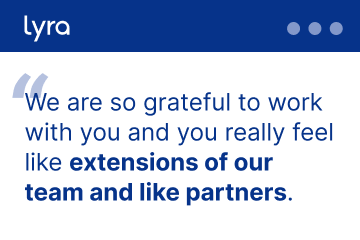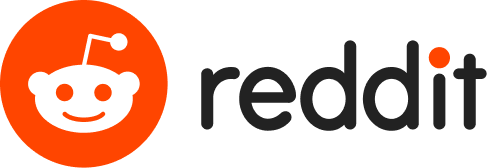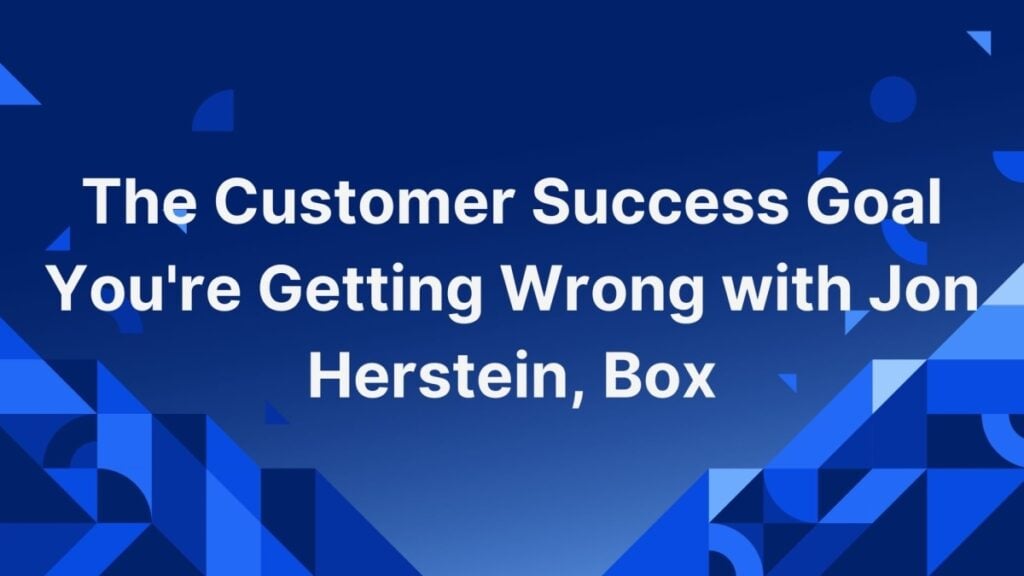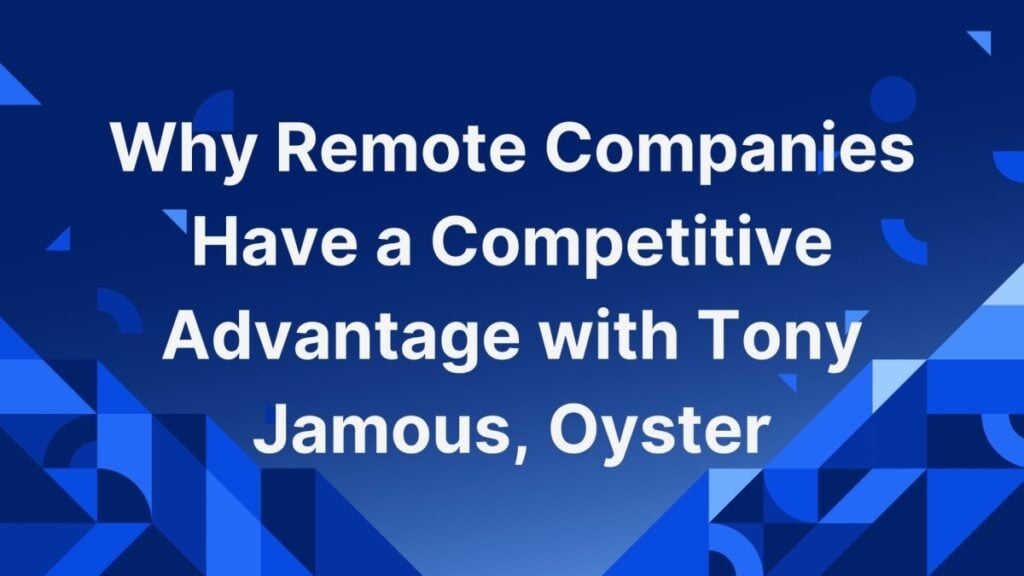-
 Resource Center
Resource Center
Discover enablement best practices and more in our resource center.
-
 Blog
Blog
Read the latest on enablement, learning and training trends.
-
 Podcast
Podcast
LEARN from the top leaders in SaaS.
-
 Videos
Videos
Watch videos and gain actionable insights from leading experts.
Building a CS Team
of Domain Experts
with Tim Smith, Head of Global Customer Success & Product Sales, Stripe
It's no secret that understanding your customers is one of the biggest keys to your success.
Especially in the FinTech.
Domain expertise as a FinTech CSM is more than understanding the tech and the jargon of a specific industry. It’s also about realizing what customers encounter daily.
“You're a tech company, but you sit on the global financial rails, which is a thing that's largely out of your control. You have to become an expert in that, and you have to become an expert in everything around payments. You have to have a love of that and getting into the weeds on that because that's actually your day-to-day value to your customers,” says Tim Smith, Head of Global Customer Success & Product Sales at Stripe.
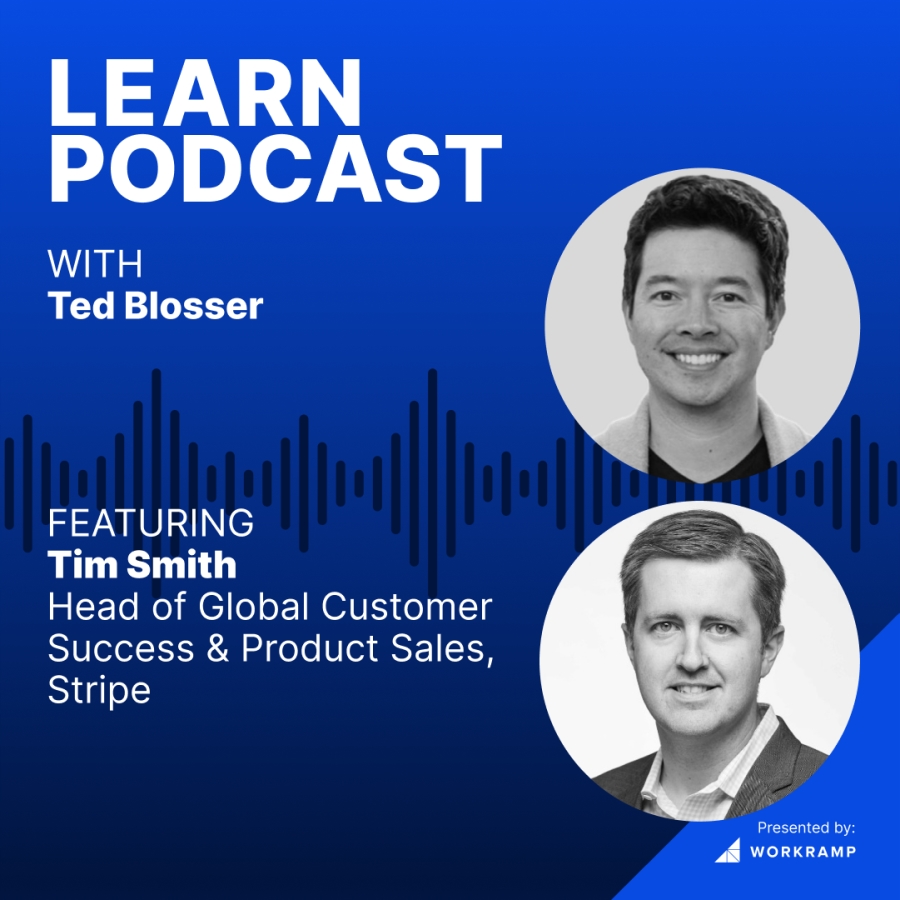
In this episode, Tim chats with Ted to discuss the value of having a team of domain experts in his role as customer success. Along the way, they talk about what companies get right and wrong in professional services and the coalescence of customer education and pro services.
In this episode, you'll gain insights into:
- Understanding that your professional services are a talent engine for your company
- How to cultivate domain experts through an excellent onboarding experience
- Creating a culture of documentation gets people on the same page faster, which is vital in the fast-paced world of FinTech
Listen on your favorite podcast app to learn more about how you can uplevel the customer success in your organization.
Timestamps
[03:07] What companies get right about professional services
[06:24] What companies get wrong about professional services
[09:17] Scaling customer education
[11:25] The importance of domain expertise
[16:41] Turning traditional CSMs into superstars
[18:29] Improving customer success processes
[21:03] LEARN Rapid-fire round
Resources
Podcast Recommendation:
Transcript
Tim: I don't know what I thought FinTech was when I came in. I thought, it's like a tech company, but you do financial things.
It's more than that. It's like If you're a tech company, but you sit on the global financial rails, which is a thing that's like largely out of your control. And so you have to become an expert in that and you have to become an expert in, payments and all the things around payments.
You have to have a love of that and getting into the weeds on that because that's actually your day-to-day value to your customers. that you understand the world they live in, the pains of it, the upside.
And that was a big breakthrough for me. Like if you're a domain expert and you understand serving a customer, you're going to have a ton of value, in that equation and help make the product really sticky.
Ted: Hi, I'm Ted Blosser, CEO and co-founder of WorkRamp, where we're redefining the corporate learning space with the world's first all-in-one learning cloud for employee and customer learning. Welcome to the Learn Podcast, where we learn from the biggest leaders in SaaS and hear what makes them successful.
Hope you enjoy the show.
Hey, everyone. Welcome back to the LEARN podcast. We have a special guest on today. Tim Smith, Head of Global Customer Success and Product Sales at Stripe. Welcome, Tim.
Tim: Yeah, thanks, Ted. It's great getting reconnected again.
Ted: Well, Tim and I used to work at Box. I was excited to have him on, his sister actually works at WorkRamp too. but we're here to talk about you, Tim, today. Let's kick it off with some background on yourself. Can you give us an elevator pitch on who you are and what you do at Stripe?
Tim: Yeah, sure. I'm Tim Smith. I work at Stripe. I run customer success there and the global product sales org. spent my whole career in technology. Interestingly, I started at Accenture, went back to when it used to be called Anderson Consulting and about a year into my tenure. They formed a joint venture with Microsoft that was called Avanade.
I was in the first 100 employees there. Spent 12 years working there, they were almost 18, 000 people when I left. at that point I was traveling a lot, had young kids, and that's when I found Box. And I, went over to Box to run their professional services organization or start that organization.
And it was pretty fun. I had been in a role where I was managing 200 people and I took that role and I was managing two people and just building from scratch and was really lucky. Got to build up an incredible global team there. I took on customer education, which was really like where I got my feet wet in that space and the support org.
It was just a lot of fun over seven years. And then about four years ago, I went over to Stripe first role there was account management for our big, us accounts. And about two years ago, we decided to start a brand new customer success function. So I got that off the ground. And then, recently took on the product sales org, which is all about helping our customers, start using, some of the newer products that we have and really growing other lines of business in the company.
Ted: That's a great background. How was that transition from consulting to SaaS for you? Was it, something where you're like, what did I get myself into? Or was it supernatural for you?
Tim: it was a lot of fun the big difference is like as my boss John Hurstine said at the time I know you've had on here before is like when you work in a consulting firm, the people are the product. And so you're used to being at the center of the universe.
And when you go into SAS, the professional services are an important product, but not the main product and your whole world exists to basically help, grow the product and its usage. And so that was a big transition, but other than that, I loved it because I think you can really build these like mission-driven teams because they love doing services, but they really love helping turn the company into something bigger and more important.
And, I really enjoyed that. It didn't take long to get used to it.
Ted: For today's conversation, I thought we'd talk about two of your sweet spot focus areas. The first one is professional services. I'd love to ask you a few questions about that. Then we'll switch gears into your time at Stripe and what you've learned from a customer success side. Let's start with pro services.
And maybe you can tell us a little bit about the scale when you're running just a pro server or a box you don't have to disclose like actual revenue numbers, but like seven digits, eight digits, what was under management. Alongside that, what are companies in SaaS getting right on the pro services side?
Also, what are you seeing companies get wrong on the pro services side as you see it?
Tim: in terms of the scale of the business at box, yeah, it was, an eight-figure business. You know, we had always said we'd be under 10 percent of the company's revenue. We were always under that, but, it was a healthy, sizable business. I think the things that we got right there were like one making the services packaged and really easy to buy.
You just want the customers to say, yes, they often have a budget for services. What you don't want to do is make it complicated and difficult for them to buy. So we really try to focus on being packaged and predictable. I think the other thing that really worked is like, it was very mission-driven team.
Like I mentioned before, people who were great at services and working with customers, but really cared about the success of the company and the adoption of the product. the third thing I think is like an underrated part of having a pro-serve team is it can be a talent engine for your company.
It's a place where you can take people out of other fields. Out of nontech industry companies and, find the fits for your company culture and grow them in, to other roles. I mean, I had a ton of people in my time at Box went to the product org. We were a big feeder there. certainly the SA and SE communities, even some like AEs in my time there.
That's something that really worked well.
Ted: before you get into what people are getting wrong. Talent engine. On the professional services side, what are you looking for? Like in terms of, Hey, when I see this, I know they'd be a great fit, even if they're coming out of another industry, as an example,
Tim: Yeah. I think the things I'm looking for is just Drive and strong sense of urgency. sense of urgency is something that's hard to teach. And it's just like, do I understand what is really important? Do I understand when I need to escalate something or when I need to go get an executive stakeholder involved?
And then just, polish and care, how much do they care about their communications and the material they're presenting and can they learn fast, the products like ever-changing and you just need to be a lifelong learner. Those are the main things I'm always looking for in that kind of role.
Ted: Any learnings on the packaging? For example, did you overprice to start with underprice and then how did they evolve over the years, at Box.
Tim: Definitely underpriced. It's funny; almost every company has like their basic packages called the quick start. It's the thing I've learned. Like we have the quick start, and you probably remember the smart start and the full start, which was the statement of work version. It's just a great name. Cause you're like, I'm a SMB-ish customer. I've got 50 to a hundred employees, and I can use a little bit of help the quick starts made for you. And so that was what we called it. we definitely underpriced. I mean, I think our basic one cost 1, 000 in the first iteration, and it, was 8 to 10 hours worth of work.
So it was pretty much impossible to make money if you loaded all your costs in on top of that. but what we proved through that is that, it was a thing that could get value, and, people were successful. the best thing we ever did is we measured the impact on gross and net retention.
And what we just saw is customers who have these packages churned far less and often they expanded much more quickly. So if you were like, a sales rep at box and you were like, this is going to make sure they adopt all the product they bought and they'll probably upsell sooner. It was kind of a no-brainer that you'd want this on every customer.
Ted: what are companies getting wrong? I'm sure you advise some people building up pro surf orgs. What are they getting wrong, would you say most often?
Tim: one of my biggest regrets about the services business we built at box is like. You should standardize and give away some of your basic, service offering, maybe not the human elements of it, but like, what's your standard methodology? What are the basic deliverables?
Everybody should have, I think that stuff should just be out in the public domain. And, one thing I love at Stripe is really famous for our docs. Your docs can include the best practices for getting started and how to write an integration. I wish I'd spent more time on the self service methodology, giving that to partners, those kinds of things,
Helping see the partner ecosystem, I think is really important. And it's a tough, thing when you're like in the 25, 50, 100 million kind of ARR range because there aren't going to be a ton of partners naturally, interested in your product, but like finding some of those early players that are like, the 50 or a hundred person SI partner that's interested in doing business, really seeding them earlier is probably a thing I think a lot of companies could do better.
Ted: One big part of our audience is here is the customer education audience and you also,put this on your LinkedIn profile of how integrated you have customer education within the pro services offering. And it sounded like you took that over. Give us your viewpoint on the kind of coalescence of pro services and customer ed,
Do you have any viewpoints on the two coming together?
Tim: Oh, yeah. I love the customer education. I mean, that is, one of my, like, secret joys in my time at Box. It was a really fun team. Basically I was asked early on, we had somebody named Maria Marquis and she was like part-time CSM and part-time education person.
And it's like,do you want to work with Maria to go build this? Education business. And that just ended up being like an absolute blast. I work closely with Maria. She's like well known in that education community. Now, brought in some other people over time, like Jesse Evans and Alessandra Marinetti were all people that worked on my team, but we hired atypical tech talent, and we decided it was more important that the training was just like fun and engaging.
So we had a bunch of people who were just actors and just characters in general. And their whole goal was like, how do I make training a box admin really fun? it takes a certain kind of mind to do that. And so, we ended up with this group of fanatics. When we would launch a new class, they would just take it.
And there were these people that would like often take the same class over and over again, just cause they loved. Being part of that education experience I never even thought that would be a thing. And so what happened is eventually, with our pro serve, customers would just come back to us and be like, Hey, we want some private training.
And so we went back, and we're like, Hey, Maria, can we do this? Just like a class that doesn't have other people in it. And it was like, yeah, sure. And then they were like, can you tailor it more to our workflows, our culture, our company? we'll pay you a, 5 or 10 X premium for that. so that business just took off on its own.
And, maybe there were like 10 people on that team, and we just had like a deep backlog of both public and custom training. And, it was a great product, and a lot of fun and just was like part of our service offering.
Ted: I want to switch gears into CS in a second, but I want to double-click into the customer education for a minute. When you see an org get to 10 to 11 people, I think a lot of people rarely see that scale. Like you might have one or two instructional designers and a program manager. How did you justify getting your customer education program to that scale?
Was it purely by the soft numbers of, let's look at these accounts and they have great NRR and great MPS scores? Or were you, using hard metrics? To go justify this up to John and Aaron Levy, like how are you justifying investing so much in a team?
Tim: yeah, it's funny. Early on, even before we had the professional services training, I remember going to an operating review with Dan Levin and, we're real early in the program with like one or two people, and we had trained 500 people the month before. And Dan, was just like, Never show me the slide again.
500 is just not a relevant number. He's like, when you're training 10, 000 people, you can show me the slide. And so we just took that as a challenge. And we're like, okay, we have to get this out to as many people as possible. That was kind of where it started.
From there, it was like, how do we measure things like product usage and, the features they had turned on and there was definite benefit there and then, tied in with consulting once you had a P and L to pay for it and you have metrics that showed, basically prove that this drove better retention of the product, it was just a no brainer.
And that was, what got Dylan's mind who was CFO wrapped around. It was just like, this business, pays for itself and it drives a better retention story. So long as you keep those two things to be true, you hire to what you need. And that was a great formula for success.
Ted: Everyone, we're talking to Tim Smith right now from Stripe, and there's two important topics he's talking about right now. One is the importance of making your team, your CS team domain experts, and then to the importance of customer education in professional services. If you're looking to do both, look no further than WorkRamp.
WorkRamp can train your CSMs to be the best domain experts they can be, and then also can train your customers through customer education. So if you want to learn more about our learning cloud, visit us at workramp. com. Now back to the show.
All right, let's switch gears into your time at Stripe. Stripe is such a famous company. let's go through a couple of quick questions on the Stripe experience. You've been there about four and a half years, now.
And the question I want to ask is, so you go from ProServe into CS.
What's the most, let's say unique insight or unexpected thing you learned from running a CS or in terms of valuation, 50 billion company, what have you learned?
Tim: I felt very lucky at Stripe. It is just inherently a customer-centric company. Our very first company operating principle is users first. Our weekly all hands has a customer on it every week. Our product managers are always out interviewing customers. So sometimes I feel like customer success is like a religion. It was just already a thing. It's right. But just wasn't, called that, It was more that we had started to get into some of these bigger, more enterprise kind of accounts and you needed that capability.
For me, the biggest insight is just I've realized that CSMs need to be domain experts So like FinTech is kind of wild in general, I don't know what I thought FinTech was when I came in. I thought, it's like a tech company, but you do financial things.
It's more than that. It's like If you're a tech company, but you sit on the global financial rails, which is a thing that's like largely out of your control. And so you have to become an expert in that, and you have to become an expert in, payments and all the things around payments.
You have to have a love of that and getting into the weeds on that because that's actually your day-to-day value to your customers. that you understand the world they live in, the pains of it, the upside. And the CSMs, they're not solution architects, right?
So they're not the ones telling you what to do with the APIs. They're really the ones that deeply understand your business and then can tell you how the product, can be optimized to get the most out for your business. And that was, the big breakthrough for me. Like if you're a domain expert and you understand serving a customer, you're going to have a ton of value, in that equation and help make the product really sticky.
Ted: your mindset that hiring CS people that are not domain experts and then you convert them to domain experts? And if that's the case, how do you convert people to become domain experts? Have you figured out the playbook? for example, is it just like amazing onboarding?
That's a lot lengthier than a typical SAS company. what have you
done there?
Tim: yeah, it's definitely an intensive onboarding. the best teams come from blending talent together. I've seen that all through my career, and that was certainly something I know in our time at Box was like blending, who was the homegrown sales talent with the people who had spent, two decades at Oracle.
And we've taken the same strategy in the CS org, which is like, some people come from a financial services background, some from a tech background, blending them together, gets us the best of both. even one of them longest tenured managers, she comes from 20 years in banking and I had a really long tenure in tech.
And so we've worked really well together because of that but the onboarding is a big deal. And, everybody has to learn about. financial technology at Stripe in general, but then we go much deeper. We have a program of shadowing and you do a mock demo and, run through QBR and a bunch of reporting.
And, it does take time to really get sharp because if you show up, in the user conversation and you don't know anything about the domain, you're really not adding enough value to that conversation. you like learn from your peers because that's what payments are like, it's really deep, but there is some structured curriculum pieces to it as well.
Ted: I know you have the best API docs as an example, but do you have strong documentation culture internally that also helps people become domain experts if that's true, how do you make sure everyone contributes from the team?
Tim: Stripe is all about docs. we use Google docs internally a ton. I mean, presentations are not as commonly used here. We're really deep, reservoir of confluence content. And I kind of joke when you're new. You go through the Gartner hype cycle of like, at the beginning, you're learning a little bit about payments and you're like, so excited.
And then there's a point where it's like, the more you learn you realize, the less you actually know. And so it'll be like, I want to learn more about credit card disputes. And so you go read the like canonical article and you get done and you're like,
I just learned about 10 more things I didn't know and so docs are definitely a core part of the culture. And we're constantly doing projects to like refresh our content, make sure it's updated. It's just like a cultural part of our org, like helping other people. It kind of works if there's a new CSM on the team, you want them to get sharp fast because, we're constantly stretched for capacity and getting that person ready and making sure they have the right content is important to the team success.
Ted: I want to talk about the sales aspect of being in customer success at strike. But before I do that, can you give me a quick understanding of the commercial aspects that a CSM owns like renewal, for example, upsells just so we all have good context into this question.
Tim: the setup we have at Stripe is, all CSMs work with an AE and they basically own the full extent of the commercial relationship with the customer. that being said, payments industry in particular is a little different. if you think about it, you're just always talking about money all the time.
The accounts pricing and how much they're spending on Stripe and how much they're spending on, card network fees and those are just like an active part of your conversation all the time. you are part of the customer's ROI equation, both in terms of The uplift that you bring them, the fraud you help them prevent, and also what they spend on you directly. So, I would just say the commercial question is just different here. we're not negotiating the fees, but we're talking about them all the time. And that's just a part of FinTech. And at first, I didn't know how I'd feel about it, but I actually think it's great.
It's not like the financial piece of the relationship is like a secret. Everybody knows exactly what it is in the relationship, and I think it actually increases transparency with our users.
Ted: So let me ask you this broad question, and it kind of relates back to what you said earlier around how you hired for professional services professionals that weren't typically in the industry. when you're building out. CS teams, and you need someone who is comfortable talking about commercials, is comfortable talking finance, is comfortable closing or asking for more from a client.
How do you instill that commercial mind in this? Is it through things like Extensive training sales frameworks you actually put on your team from a traditional sales trainer. What is it that helps take a traditionally molded CSM who's not comfortable with that to the superstar who can be a CSM and talk about commercials or even the pro services world?
Like, Hey, I want to upsell you into a package. It's going to cost money. What's your philosophy around that?
Tim: Well, I think it's twofold. One, because we do hire a decent number of people out of the financial services industry where like account management, is the most common kind of existing customer servicing model. that inherently is, those people come comfortable talking about commercials.
We still have to like reinforce with our teams all the time. even on things like professional services or paid support offerings. I think sometimes people's default is to feel bad talking about those things. Like, I hate to bring up that I'm going to ask you, you know, spend money on this, support service or this professional service, but like, you just have to remind people all the time that these are valuable offerings that, we work really hard to bring, terrific people into our company.
And when you're paying for these, services, like you get a value, you get a high ROI out of it. I think that is a learned behavior for almost everyone. And then, when you ask being prepared to back it up why is it worth the money?
So not everybody comes in Ailey with it, and it's just the thing, we got to help people along with, and, managers push it in their conversations with their directs is probably. a big part of it.
Ted: The last thing I'll ask on the CS side and we'll head into the learn rapid-fire round, is there a change or an improvement you made that had, more outsize returns like a segmentation as an example or something like that, that you can recall that you're, pleasantly surprised with.
Tim: I think, one that I'm like fond of in this organization is we have the CSMs there. like industry domain experts, but then we actually even have a small team that I also run called payment performance and they're typically people you know, are like your deepest experts, like directly out of industry.
They've either been the head of payments at 1 of our customers, or, maybe ran a payments or get a competitor. so that thing is certainly had an outsized impact. Like I said, financial service is
fascinating because the global financial rails, we just bring them in for like the very hardest things again, because if you think about like a payment transaction, you as the merchant, you pass us a bunch of data about the transaction. And then we might be on like Visa or MasterCard or ACH, and they all have their own rules and set of fields you pass them to, and then they go to like an issuing bank, and they have a set of rules about how to use that data. It's not as, deterministic as like, we're a box. If I upload a file, you pass me back a code to confirm the file was uploaded, you know, 100%, exactly where the file is, you can confirm it. We can do that too, but, it passes through a number of intermediaries along the way, and you really need to know about how those work. And so that team is a team I took on a couple of years ago, but it's just like a lot of fun. And, we use them to go solve some of the really hardest problems where you need more of that, like cross industry, underlying rails capability.
And that we get a great return on of, and I always joke with that team that their main job is to like, put themselves out of a job. So whatever the hardest thing is you figured out, last year, we just need to make it available for everyone on the team. And so that shows up for us like an authorization rates, which is like how many of your payments are being accepted or.
Network costs, which is for the fees that the card networks, charge you, how do you most optimize those? So you pay exactly what you should pay versus you pay a bunch of penalties. so that's the thing that's gotten us really high return. We've turned like one off sweeps on there and to just Ways of working. And then every CSM, every AE is using those tactics, in their accounts. And that has kind of just had like an incredible, return for us.
Ted: that's awesome to hear. And, it's funny. I just finished up the, SBF book.
And just the forensic accounting on finding where all the billions of dollars. It just gave me a lot more perspective into what you said of like, how crazy the financial system is.
But if you think about being a SaaS company or payments coming on top of that, that makes your job even harder, especially in the CS world when people look to you as the experts. Tim, let's wrap up our content with the rapid-fire round. We did some great discovery on professional services. Also, what you would recommend from a CS perspective.
We'll close off with just a few quick questions for the audience, just to learn a little bit more about you. I'll start with this. What is one podcast book or blog you've learned the most from, or that is top of mind for you right now?
Tim: probably one of my favorites is, invest like the best with Patrick O'Shaughnessy. he just has like leaders of incredible companies. Hopefully, Ted, I'm hoping to hear you on there at some point. But, I enjoy learning about how have other leaders learned their way through a business?
What are some of the discoveries they've made? I just find he gets a lot of the really human elements out of people. And then, they have a companion called business breakdowns, which is like a great way to learn about your customers and competitors. So yeah, that's a
favorite.
Ted: Have you listened to Founders podcast in that network? Have you started listening to that one?
Tim: Oh no, I haven't. Sounds like a good one.
Ted: I think they rolled it in. I don't know if it's acquisition, but it's by David Sedra, but it's part of the Colossus network now. He reads biographies of founders and then just regurgitates the whole biography in an hour, but great addition.
I love the original recommendation and highly recommend it as well too. All right, next one. You're a very efficient person. What is the productivity hack we can learn from you?
Tim: the first work thing I do every morning is just purge away as many emails and slacks as I can that either I've already processed it or I don't need to do anything with it. Reduce mental clutter is like a big thing for me.
And then I'll give you my like, counter-productivity hack, which is, when I go on vacation, I, delete the Slack app off of my phone. it was always the first thing I do and that lets me clear my mind. So two sides of the same coin.
Ted: Wait question. So what's your tip? If you finish your email in the morning, do you look at it through the day or do you have another time you close out your email? What's the trick on that?
Tim: I probably look at it a few times through the day. to be honest, just like it's a, busy role and we're always moving at a fast pace. I do look at it through the day.
Ted: Okay. I'm actually adopting what you're saying first thing in the morning, I get up and just clear my emails and then try to do it less through the day. but I do have a little bit of a nervous twitch on refreshing my gmail inbox.
All right, last one, Accenture box. now strike 50 billion company. we can learn from your career. What is the one career tip we can learn from you?
Tim: every career path is unique and has some snowflakey elements to it. So I just would say, you have to think about the work that energizes you. And then find a way through the work you're doing to do more of that work and keep learning in that space. Because I think it'll eventually take you somewhere.
And I think you'll enjoy it more. I've never like said. Hey, I want to be X someday. I want to be the CEO. I've just taken my career where the work was most interesting and where I could be part of like a mission-driven culture. And I just think if you don't lock yourself into a rigid framework, you'll likely find much more interesting roles.
Ted: Love that. Tim, thanks so much for spending the time with us today. Learn a ton from you. From pro services to CS to the lightning round here with a lot of your tips, but we'll have to catch up again soon. And thanks for being on the LEARN podcast.
Tim: Thanks, Ted.
Ted: Thanks for listening to the LEARN Podcast. If you're a fan of the podcast, Do us two favors. One is subscribe to it so you can get the latest updates of our most recent episodes.
And two, write a short review of the podcast. This helps us get discovered in the broader podcast community. Thanks again.

_Nav.png?width=360&height=240&name=Employee_LC)_Nav.png)
_Nav.png?width=360&height=240&name=Customer_LC)_Nav.png)
